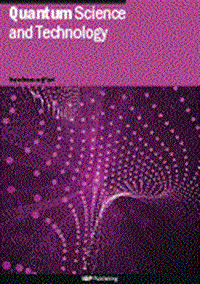随机马约拉纳星座的鲁棒量子计量
IF 5
2区 物理与天体物理
Q1 PHYSICS, MULTIDISCIPLINARY
引用次数: 0
摘要
即使是最经典的状态也仍然受量子理论的支配。许多物理系统可以用球体表面上点的马约拉纳星座来描述,其中集中的星座和高度对称的分布分别对应于最小和最多的量子态。如果这些点是随机选择的,那么最终的平均量子态是多少?我们详细探讨了这个简单的概念问题,研究了由此产生的随机状态的量子特性。我们发现这些状态与标准相去甚远,即使在大粒子数量的限制下,经典直觉常常取代量子特性,使得随机的马约拉纳星座变得奇特而有趣。此外,我们还研究了它们在旋转传感中的实用性,并找到了它们对失相和颗粒损失的鲁棒性的数值证据。我们利用光的轨道角动量自由度实验实现了这些状态,并利用多平面光转换装置实现了任意一元来演示旋转传感。我们的发现为量子增强计量学开辟了新的可能性。本文章由计算机程序翻译,如有差异,请以英文原文为准。
Robust quantum metrology with random Majorana constellations
Even the most classical states are still governed by quantum theory. A number of physical systems can be described by their Majorana constellations of points on the surface of a sphere, where concentrated constellations and highly symmetric distributions correspond to the least and most quantum states, respectively. If these points are chosen randomly, how quantum will the resultant state be, on average? We explore this simple conceptual question in detail, investigating the quantum properties of the resulting random states. We find these states to be far from the norm, even in the large-number-of-particles limit, where classical intuition often replaces quantum properties, making random Majorana constellations peculiar and intriguing. Moreover, we study their usefulness in the context of rotation sensing and find numerical evidence of their robustness against dephasing and particle loss. We realize these states experimentally using light’s orbital angular momentum degree of freedom and implement arbitrary unitaries with a multiplane light conversion setup to demonstrate the rotation sensing. Our findings open up new possibilities for quantum-enhanced metrology.
求助全文
通过发布文献求助,成功后即可免费获取论文全文。
去求助
来源期刊

Quantum Science and Technology
Materials Science-Materials Science (miscellaneous)
CiteScore
11.20
自引率
3.00%
发文量
133
期刊介绍:
Driven by advances in technology and experimental capability, the last decade has seen the emergence of quantum technology: a new praxis for controlling the quantum world. It is now possible to engineer complex, multi-component systems that merge the once distinct fields of quantum optics and condensed matter physics.
Quantum Science and Technology is a new multidisciplinary, electronic-only journal, devoted to publishing research of the highest quality and impact covering theoretical and experimental advances in the fundamental science and application of all quantum-enabled technologies.
 求助内容:
求助内容: 应助结果提醒方式:
应助结果提醒方式:


